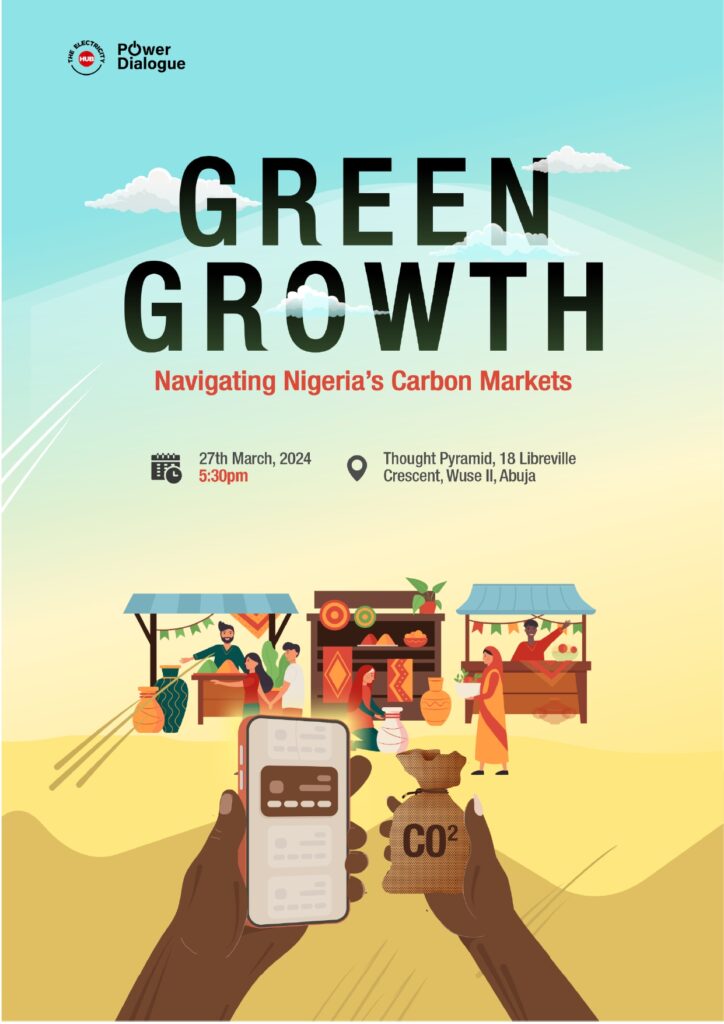- Attendees will gain valuable insights into developing Nigeria’s carbon market and effective participation strategies for individuals and businesses.
- Attendees will discover how Nigeria’s role in climate finance can drive economic growth and contribute to global emission reduction efforts.
Status Quo
On March 27, 2024, the Electricity Hub (TEH) will organise its 92nd Power Dialogue, focusing on developing Nigeria’s carbon market. The theme for the dialogue is Green Growth: Navigating Nigeria’s Carbon Markets.
As earlier reported, Nigeria’s Vice President Kashim Shettima has officially introduced the Intergovernmental Committee on Carbon Market Activation Plan.
This plan aims to create a well-rounded strategy to promote an efficient and sustainable carbon market system. The initiative stems from President Tinubu’s dedication to reducing Nigeria’s carbon emissions.
Furthermore, in partnership with the Africa Carbon Market Initiative (ACMI), the federal government is actively harnessing the carbon market’s potential, estimated at around $2.5 billion.
The committee’s formation, spearheaded by Mr. Zacch Adedeji, the Executive Chairman of the Federal Inland Revenue Service (FIRS), builds upon establishing the Intergovernmental Committee on Carbon Markets announced by President Tinubu during COP28 in December 2023.
Also note that in 2023, Carbon Vista, a collaboration between the Nigeria Sovereign Investment Authority and Vitol, entered into a Memorandum of Understanding (MoU) with the Regional Voluntary Carbon Market Company (RVCMC), a subsidiary of the Public Investment Fund, the Sovereign Wealth Fund of Saudi Arabia.
The MoU establishes a partnership focused on providing Nigerian Carbon Credits to Saudi Arabia (KSA) and investing in projects that generate high-quality carbon credits. Carbon Vista and RVCMC aim to promote voluntary carbon credits through this collaboration, thereby encouraging low-carbon economic development.
The carbon credits produced will contribute to both countries’ efforts to meet their climate targets and support the global shift toward a carbon-neutral economy.
Why you should attend TEH Power Dialogue on Carbon Markets
- General Knowledge: The upcoming March 2024 Power Dialogue will feature panellists from the private sector, the Nigerian government, and the African Carbon Market Initiative (ACMI). These panellists will engage in discussions covering various facets of the carbon market. The primary focus will be on exploring avenues for developing the carbon market in Nigeria, along with strategies for individuals and businesses to participate effectively. For example, farmers in local communities can use an aggregator to sell their carbon emissions from farming activities.
- Exploration of Carbon Market Operationalization: Panellists will guide attendees through operationalising Nigeria’s carbon markets. They will delve into local and international opportunities within the carbon market landscape. Notably, Nigeria is positioned as an attractive hub for climate finance and actively contributes to global efforts to reduce greenhouse gas emissions.
- Empowering Stakeholders Across Industries: Irrespective of whether attendees represent the oil and gas sector or other carbon-prone enterprises, the panellists will provide insights into making informed business decisions concerning emissions. Moreover, they will elucidate pathways for stakeholders to leverage Nigeria’s burgeoning carbon market to their advantage.
- Recommendations for Economic Development: As a focal point of discussion, the Power Dialogue will spotlight viable strategies for driving economic development through the carbon market. These recommendations will serve as practical guidelines for policymakers, businesses, and other stakeholders keen on harnessing the economic potential of carbon trading.
- Facilitating Knowledge Exchange and Collaboration: The Power Dialogue will facilitate knowledge exchange and foster stakeholder collaboration. By bringing together diverse perspectives and expertise, the event seeks to catalyze collective action towards realizing Nigeria’s vision of sustainable economic growth driven by the carbon market.
